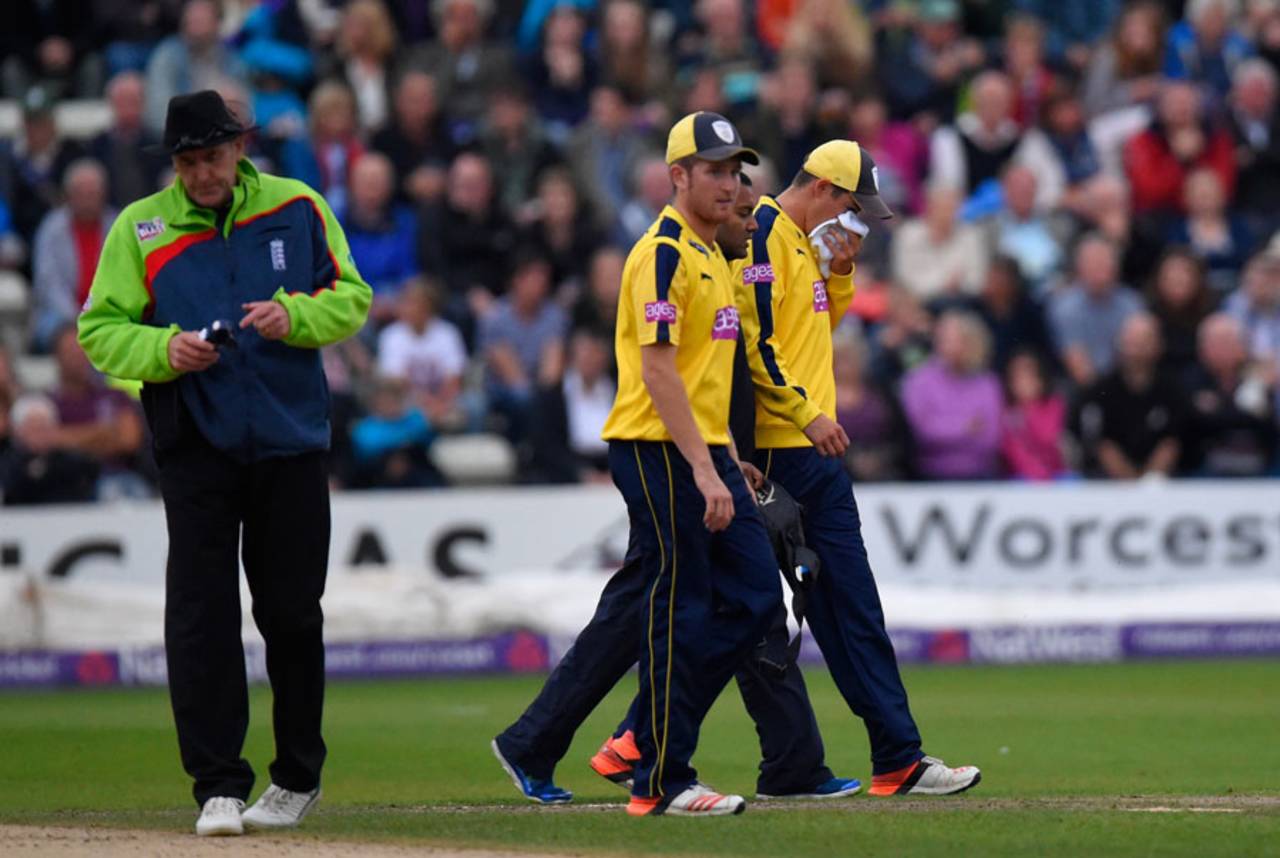Spotlight on ECB after floodlight failure
Holding an evening knockout fixture on a ground without floodlights betrays a lack of common sense. If the ECB is to back the 18-county structure for T20, it needs to take greater responsibility
Freddie Wilde
15-Aug-2015

Fading light curtailed Worcestershire's run chase - but the situation was an avoidable one • Getty Images
The timing could not have been much worse. Coming just a day after reports suggested that the ECB is increasingly reluctant to introduce a new city-based T20 competition, with attendances for the current structure soaring, the NatWest T20 Blast quarter-final between Worcestershire and Hampshire - being played at one of the four county grounds without floodlights - was prematurely ended by bad light.
With the mood at the ECB apparently shifting towards preservation of the 18-county model for T20 cricket, footage of Worcestershire fans pointing their phone torches jokingly in the direction of the pitch was hardly the PR stunt the governing body would have been imagining. You could almost hear the naysayers and non-believers chuckling at such a backward state of affairs, as the umpires and players waited for the light to improve and the sun set over New Road.
While this embarrassing situation will no doubt, and perhaps justifiably, intensify the calls for a modernising T20 competition, raising further questions about the viability of the smaller, financially weaker counties, it is more simply an issue of management, responsibilities and common sense.
Earlier in the season, Worcestershire were offered the opportunity to play their group stage-match against Lancashire under temporary floodlights but, speaking to the BBC after the match, Worcestershire chairman David Leatherdale said there had not been any such suggestion from the ECB with regards to the quarter-final.
"We had long discussions with the ECB over start times of the game," Leatherdale said. "We started all our group matches at 5.30pm, and when we looked at sunset times, which tonight was 8.36pm - the game was due to finish at 8.15pm, we could be sat here with a lovely sunny evening not thinking twice about it."
The operative word there is "could". An unnecessary risk was taken and it has embarrassed the ECB and the county - whilst also contributing to denying them a possible first Finals Day appearance. Of course, they were unfortunate with the weather, which was wet and gloomy for most of the day, but this is England and that happens; Worcestershire should know that better than most. After a wonderful 14-match group stage campaign, Worcestershire's fans and players were let down by a decision out of their control.
Leatherdale also admitted that starting at 5.30pm and no earlier - to give as many people the opportunity to come down and watch after work - was decided upon between both the county and the ECB. The T20 Blast does, of course, represent a key source of revenue for counties and it is understandable, albeit regrettable in hindsight, that Worcestershire were reluctant to move the match any earlier.
What is less understandable is why temporary floodlights were not installed, and both the ECB and Worcestershire are culpable in this regard. If they were suggested for the Lancashire fixture on July 24th, when the sun set at 9.12pm, then quite why they weren't even discussed for a match of greater importance, on an August evening with a sunset time of 8.36pm, is a dereliction of duty to the fans, players and the sport itself. There is also a rather conspicuous gap in the county calendar on Sunday.
What of permanent floodlights? Gloucestershire, Leicestershire and Somerset - the other counties without - all have plans to install them but face different struggles before they come to fruition. Worcestershire face planning problems and hazards caused by regular flooding. The ECB's stance last season was that they were "supportive" of floodlight installation but placed "no pressure" on the counties to do so. They would, however, offer support with planning and building permission.
Although it is tempting to use this mess as an example of exactly why England's T20 tournament needs to change you would be missing a more fundamental point in doing so. While Worcestershire are also culpable on this occasion, if the ECB - far richer than its county members - is to persist with the existing structure for T20 cricket and is serious about making it a success, then it needs to take proper control of the competition's administration.
Sure, the counties have their own responsibilities and would ideally be fulfilling them, but in siding with the current structure over modernisation the ECB must guarantee against such mishaps. This is the tournament where the third quarter-final of 2015 ended with the umpires waiting for the setting sun to rise. The ECB needs to get a grip.
Freddie Wilde is a freelance T20 journalist. @fwildecricket